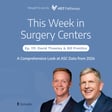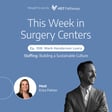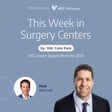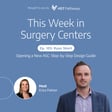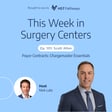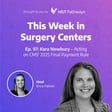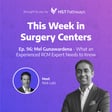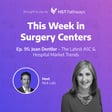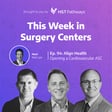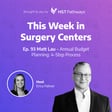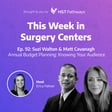Introduction
00:00:01
Speaker
Welcome to This Week in Surgery Centers. If you're in the ASC industry, then you're in the right place. Every week, we'll start the episode off by sharing an interesting conversation we had with our featured guests, and then we'll close the episode by recapping the latest news impacting surgery centers. We're excited to share with you what we have, so let's get started and see what the industry's been up to.
Payer Trends with Lisa Rock
00:00:28
Speaker
Happy Valentine's Day. Here's what you can expect on today's episode. Lisa Rock is the president at National Medical Billing, and she's here to talk with us about all things related to payers and how they impact your revenue cycle. We'll specifically dive into payer trends that ASCs should be aware of. In our news recap, we'll cover marketing your ASC, tips from 55 industry leaders on successfully running your surgery center,
00:00:56
Speaker
tips for post-op nausea and vomiting, and of course, end the new segment with a positive story about a boy's classmates who made him a prosthetic hand in their engineering class. Hope everyone enjoys the episode and here's what's going on this week in Surgery Centers. Hi,
Role of National Medical Billing Services
00:01:18
Speaker
Lisa. Thank you so much for joining us on our podcast today. You're welcome. How are you, Erica?
00:01:24
Speaker
I'm doing good. We are so excited to have you on. I do feel like not much of an introduction is needed, but just in case some of our listeners aren't familiar, can you tell us a little bit about yourself? Sure. Well, my name is Lisa Rock, as you've already mentioned, and I'm the president of National Medical Billing Services. We're a full-service revenue cycle management company. Awesome.
00:01:50
Speaker
Ooh, I like that. And again, I feel like no introduction is needed for national medical billing, but fill us in on a little bit more about what you guys do and how many ASCs you work with, your presence, all of that good stuff. Okay. Well, we manage the red cycle for the entire outpatient surgical episode of care. So that would include the facility, which is the surgery center or HPD.
00:02:17
Speaker
Also, the professional side, which would be the surgeon's fee, the anesthesia piece, and then any ancillary services that might go along with that, such as lab or DME, something like that. So just about anything that a patient would see clinically in the outpatient surgical episode of care, we would be able to handle the billing for that.
Coding and System Challenges
00:02:46
Speaker
today we're here to talk about revenue cycle trends for 2023, which is always timely and interesting. And I feel like our industry can't get enough tips and tricks for how to improve their revenue cycle processes. So we're just going to dive right in. First question, what are some coding trends that you're seeing? The coding trends we're seeing are a lot of
00:03:12
Speaker
Surgeries today are newer in technology and technique, and there really isn't a good CPT code assigned for that service. And unfortunately, the way the current structure is set up now, that procedure would have an enlisted code, and Medicare doesn't pay for enlisted codes.
00:03:39
Speaker
And unlisted codes have a lot of other problems as well. Sometimes the net revenue is unknown. You get paid by a report by some contracts. And if you're not sure what you're going to get paid and your accountants are looking at net revenue at time of charge posting, except for maybe the unlisted codes, which are sitting on your books as gross,
00:04:09
Speaker
it's a little difficult to measure and manage. And so we're seeing more and more of these unlisted codes today. And then
Pre-authorization Hurdles
00:04:19
Speaker
I'll also mention too, sometimes surgeons want to get the closest thing to that code and you just can't do that. What we have to figure out is how we can get the system to move faster to keep up with
00:04:37
Speaker
the newer procedures, the newer technology that we're seeing so much of today. And then one more piece to that I would mention, sometimes the enlisted codes require pre-authorization. And now we're going down a whole new rabbit hole with that. So I would say that that's a trend that we're seeing more and more of last year today, especially in orthopedic surgery.
00:05:09
Speaker
Yeah, I feel like the pre-auth stuff is coming up so much more often than it was previously. And it's getting harder to kind of identify those cases that require pre-auth. Is that correct? It is absolutely correct. And one of the reasons for that is we might get what's scheduled authorized.
00:05:34
Speaker
And the surgeon will go in and do even a little something different on top of the main procedure, something different altogether. And so the auth is no good. And so that is a real problem. But this one's really going to shock people. You can do everything right and you can put the auth on the claim form and you can send the claim in. And lo and behold, you get a denial that says no auth.
00:06:04
Speaker
denied. So you call and you tell the payer the auth number is on the claim form and they say, oops, my bad. We'll go ahead and reprocess it. And so you've just lost like two to three weeks of deposit for that surgery. And it's happening more and more today. So you're right. It's hard to track.
Automation and Manual Claims
00:06:31
Speaker
One of the things that we're noticing here is as we try to reduce the error rate in coding and payment posting and AR through automation, we find that the payers are kind of in our way with that by putting technicalities on the claims adjudication process.
00:06:58
Speaker
that would kick out a denial in the automation process. So for example, let's say you're billing an implant and the payer, and by the way, they're all different in the requirements, but let's say you have one payer that requires you to circle the dollar amount in the patient on the implant invoice with red pen. I mean, you can't automate that. So there are numerous things that the payers are doing to get in the way of automation
00:07:25
Speaker
to reduce the error rate and speed up the clean claims adjudication process. That's a lot. That's a handful. You know what I'm saying? And there are thousands of those scenarios. There really are. Yeah. Okay. That's all super helpful information. So moving on to our second topic here, what trends are you seeing with implants?
00:07:53
Speaker
So the one that I just mentioned is definitely a trend where technicalities on the implants. But with the newer implants that are coming out, your older managed care contract might not be covering the cost of that. And also your vendor, meaning your device vendor contracts, they might not
00:08:20
Speaker
be covering some of the newer implants that are coming out. So you need to look at two things, your managed care contracts and your vendor contracts, and make sure that you're controlling the new technology through both of those avenues. Because it is not uncommon for a very expensive, meaning high-cost implant
00:08:46
Speaker
case to fall in a bucket by a particular pair that doesn't pay for implants. And so the more you do those cases, the more you're losing real cash because you have to pay that vendor within 30 days, the device vendor. And if you negotiate a certain rate for implant, and this particular newer implant
00:09:14
Speaker
is outside of the scope of that contractor paying a higher rate than you think. So there are two areas to look at with the newer implants. So that's definitely one of many implants that I can talk about. Yeah, I'm sure another one will come to mind when you're asking me another question.
00:09:43
Speaker
Yeah. No, and it's interesting that we're talking about implants too, because I feel like that's coming up more and more on our end as well. How can
Out-of-Network Management Challenges
00:09:51
Speaker
you determine the profitability of a case when implants are involved? And this is obviously just one piece of it, but yeah, it's definitely such a hot topic right now. Well, and some of the pairs have contracts with implant vendors such as IPG.
00:10:12
Speaker
or you're talking about the process of handling an implant being different with the payers in your facility. So you're asking someone to stay on top of all of those different procedures by payer and that's hard to do too. Sure. Yeah, a lot of moving parts there. Switching gears a little bit, what are you seeing with commercial payers?
00:10:42
Speaker
Well, there's definitely a move to control cost in current reimbursement methodology. So we're seeing something like COPS, for example, that the blues are using. And it is a reimbursement methodology that mirrors Medicare HOPD.
00:11:12
Speaker
And in many instances, it's not favorable to the ASC. And it's very different. It's a very different look compared to what we're used to seeing in this environment. So something that has to be looked at with a magnifying glass, really, like line by line. So we're seeing reimbursement methodologies changed. We're seeing denial rates for everything you can think of.
00:11:43
Speaker
increase by a lot, medical necessity, the auth issue that I talked about. And it's difficult now for any AR department, any AR department in the country is down top of what's happening. It's not difficult to make a call to an insurance company or check a portal or whatever, but to figure out what's going on, fix it and get that claim paid.
00:12:09
Speaker
That's a lot of work and it's very difficult to do today. It really is. Yeah. And how do you think surgery centers can continue to build out their relationships with payers? I guess, is it possible to have that more one-on-one relationship? So when you do pick up the phone, you can get to somebody faster or just kind of get more on the same page as, as the payers. It's much harder than it used to be. So yeah.
00:12:40
Speaker
We used to be able to take our reps to lunch and get to know them and they would get to know our practice and we would develop a good relationship with them. Those days are pretty much over. And today, when the payer market is dominated by self-funded plans, it means that the payers
00:13:09
Speaker
don't really have as much of a say as they used to. It's really an employer driven market today. So now we're talking about how do we develop a relationship with the employers? And that's really, I think, the way we should be looking at this landscape today, is developing a relationship with the people that actually pay the claim.
00:13:34
Speaker
And probably 65 to 70% of the time, it's the employer groups and these self-funded plans. So it's kind of hard to have a conversation with one of the big four when they're simply an ASO or administrative services only model. And their whole mission, right, is to drive down the rate as much as possible so that they can keep that contract with the employer group.
00:13:59
Speaker
That's really what it's about, the bottom line. So it's a very different environment today. I don't have a good answer for that one. I really don't know who your larger employer groups are and try to work with them directly. Yeah, no, it's helpful because I do feel like that's a conversation we end up having sometimes and I'm always looking for an answer to that question. So it's definitely hard to come by. What does the out-of-network landscape look like today?
00:14:30
Speaker
Uh, uh, so a zillion years ago, uh, when I started in this business, I was managing an ortho group and, uh, we were actually out of network with Medicare. Can you believe that? I don't care about that very often today. So I've been, I've been swimming in the out of network arena for a very, very long time. It's always been hard, but today, um, we're seeing the squeeze, uh, put on
00:14:58
Speaker
the surgery centers in the auto network environment. So there's language, if your facility is participating with a commercial payer, we're seeing language that if you bring an anesthesia group that's out of network, or if you bring in a surgeon that's out of network, or a lab where you send your pathology to,
00:15:24
Speaker
you could see your facility reimbursement reduced 10, 20, or even 40%. Some of the contracts are written, if you bring it out of network, we're not paying anything at all. So the carriers have their ways. And you may want to stay out of network. And in some instances, it makes sense if you're not getting a fair reimbursement.
00:15:54
Speaker
Because if you sign a bad contract, I mean, how long are you going to be in business? So if the carrier is not willing to work with you, and it's a tough market, and you have to know what you're doing when you're sitting down with these folks, sometimes staying out of network is very difficult. First of all, the work that you have to do on the front end, understanding what an SPD is, looking it up, understanding how that claim is going to pay,
00:16:21
Speaker
many times the claim will pay at a Medicare rate. So if you take an out of network charge, let's say $10,000, they can go for a lot more than that. And you apply a Medicare a lot amount, let's say $1,000. And now you layer on the patient out of network benefit configuration, which is
00:16:47
Speaker
heavy patient responsibility when it's out of network. You might be getting a check for 20 bucks. So looking at the work that's involved, which is an increase in cost from a staffing perspective, a longer time to pay, much longer time to pay, a high rate of under payments, and then a lot of work to get what's due to you, if what's due to you is usual in customary.
00:17:17
Speaker
I would say, you know, there's still a place for that, but it's a very difficult, it's a very difficult place to navigate. Yeah. And with these conversations with payers and implant trends and out of network stuff, where does kind of data fall into this kind of data reporting?
Data and Benchmarking in Revenue Management
00:17:41
Speaker
Like what does the ASC need to arm themselves with so they can go into these conversations
00:17:47
Speaker
you know, kind of with a good fight. Well, I think knowing your data is important. So I'll give an example. If the average cash per case, and that's how we measure a surgery center, cash per case, cash by specialty, cash by payer, there are a couple of different ways, but know your managed care contracts, know what you're supposed to be paid, and then know how you're getting paid.
00:18:16
Speaker
which are supposed to be the same thing, by the way, but not necessarily. It's net revenue and collections. So understanding that piece will get you away from looking at a secondary, you can't stay on top of all of it. I know that realistically administrators are tough and they want every single dollar collected. They want every single claim paid in their title to that. But the truth is,
00:18:44
Speaker
you really have to ask yourself, do I want 98% of it to come in? Or am I going to make a mistake while I'm looking at the landscape and not bring in the 98% to focus all of my efforts on that 2%? So you can't even make that decision unless you understand your numbers. And so understanding your numbers means that you have to have some basis
00:19:14
Speaker
of benchmarking. And there isn't a lot of it out there, by the way. So I think using state information can be helpful. Using fair health information can be helpful. Using your own historical data can be helpful. But putting it all together and really understanding your numbers. What's my gross revenue? What's my net collection rate? Pardon me, my gross collection rate.
00:19:44
Speaker
What's my payer mix and cash per case? Those are important. Days in AR, it's important but not as important as it is in a hospital because I just mentioned the implant thing. The implant on a claim can trip up a claim almost all of the time. And so I don't want my days in AR to be 28 and then
00:20:13
Speaker
not go after that implant. So understanding your numbers first and then developing key performance indicators on your numbers. You can't throw out KPIs. They're going to be meaningless unless you understand your data. Perfect. Yep. That's exactly what I was looking for. I think that's great advice. All right. And we do this every week with our guests. What is one thing our listeners can do this week to improve their surgery centers?
00:20:42
Speaker
Great question. If I could say just one thing, it would be get copies of your managed care contracts. This is what you're supposed to be paid. It was one of the data elements that we talked about. What is your net revenue? You're not going to know unless you have copies of your contracts. And you might say, well, they're loaded in your system. And I'll say, well, they can't all be loaded like that correctly. And then if there's a change in the contract, was that
00:21:12
Speaker
was that fixed in your systems. So many times it's not. So please get copies of your managed care contracts, read through them and see exactly where you're supposed to be paid. Don't trust that the payer is doing it the right way. Perfect. That's great. All right, Lisa. Well, I sincerely appreciate your time and thank you so much for sharing all of your advice with our listeners. You're welcome, Erica. Thank you.
00:21:43
Speaker
As always, it has been a busy week in healthcare, so let's jump right in. Our first
ASC Marketing Strategies
00:21:49
Speaker
story comes from the February edition of ASC Focus again, and it's all about marketing your surgery center. Historically, marketing is not something that this industry has prioritized.
00:22:02
Speaker
In other industries, a business could never survive without some form of marketing strategy. And I truly believe that that reality has been making its way to the ASC industry for quite some time now. ASCs can no longer just rely on physician referrals to sustain their case volume. They really need to market themselves with almost the mindset of a retailer and consider their patients shoppers.
00:22:29
Speaker
This article has a ton of different tips, but really focuses on the importance of investing in your website, integrating video, and getting more involved on social media, or really just more involved with your community in general. And if that's through social media, great. If it's through another format, that works too.
00:22:50
Speaker
By marketing your ASC properly, you will experience not only an increase in case volume and happy patients, but also an increase in job applications, which is huge right now, an increased interest from physicians and surgeons to perform their cases at an ASC, general increased awareness in your community,
00:23:10
Speaker
Um, and then also this is kind of one of those secondary benefits, but you'll also experience a major reduction in those time consuming phone calls, such as do you do this procedure or what surgeons work there or what insurances do you accept? And so much more. So I highly suggest you check out this article from ASC focus and really lean into marketing in 2023 and beyond.
Leadership Tips for ASCs
00:23:36
Speaker
our second story, Becker's ASC shared a cheat sheet with 55 tips from industry leaders on how to successfully run an ASC. So let's really dive in and go one by one. Just kidding. I won't do that to you.
00:23:51
Speaker
But I did pick out tips from three leaders that I really liked. So I will share those and then we'll link the full list in the episode notes so you can read through them all later. So the first kind of set of tips I picked out is from Rebecca Bruce, who is the senior director at UPMC Leader Surgery Center. And she shared a few things. The first is to take excellent care of staff as they are the best resource to identify savings.
00:24:20
Speaker
Listen and respond to surgeon needs. Identify, streamline, and standardize your processes.
00:24:26
Speaker
Remember why you all do this, which is patient care. And then this one I really like. Identify fixed contributors versus growing contributors. Some staff are content to punch the clock and do a great job, and others want to grow and be part of the performance initiatives. So thank both types and make it meaningful to their specific desires. So those, again, were from Rebecca Bruce.
00:24:54
Speaker
The second set of tips comes from Gary Haynes from Tulane University School of Medicine, and his angle was all about the anesthesia side of an ASC. And there are two tips. For reliable scheduling, keep cases within planned hours of operation to avoid overtime costs and patient complaints.
00:25:14
Speaker
and then make sure you find very capable anesthesiologists. ASC patients are increasingly complicated with comorbidities, so you need anesthesiologists that can manage that.
00:25:30
Speaker
And then the last set of tips comes from Justin Oppenheimer, who is the chief operating officer and chief strategy officer for hospital for special surgery. And he shares three tips. The first is a surgeon-led structure. And he says that successful ASCs have an engaged group of surgeon leaders who care about every aspect of the business. So ensuring the right leadership structure and the engaged surgeons in each role is critical.
00:25:59
Speaker
The second tip that he shared is a unified culture. Every member of the team needs to feel connected to the mission and goals. Everyone is a leader and has an impact on quality, experience, efficiency, and results. And then the last tip that Justin shared was data-driven operations. You can't improve what you can't measure. So having a set of metrics that everyone is keyed in on helps to drive performance.
00:26:27
Speaker
So those are just a highlight. It's just the tip of the iceberg. And again, we'll put the link to the entire cheat sheet and the episode notes, and I highly recommend checking them out. Our third story today is all about post-op nausea and vomiting, which is a big issue for some patients.
Aromatherapy for Post-op Nausea
00:26:43
Speaker
And aside from that being a stressful experience for the patient, it also slows down discharges and sometimes causes readmissions.
00:26:51
Speaker
So the National Library of Medicine released a paper recently sharing the results from a study that tested the efficacy of post ease, which is a custom essential oil aromatherapy blend and how that decreases post-op nausea and vomiting.
00:27:08
Speaker
So the study had nurses provide the post-ease blend 384 times prior to administering any antiemetic drugs. And for 22% of the patients, it worked. And there was no need for further intervention. And the blend
00:27:25
Speaker
contain scents of lavender, peppermint, ginger, and lemon. And because of this, the study does support the use of aromatherapy to reduce post-op nausea and vomiting and minimize that antiemetic use. So if you don't already, this might be something you want to keep on hand for patients.
3D Printed Prosthetic Hand Story
00:27:45
Speaker
our new segment, on a positive note, three Tennessee high school students created a prosthetic hand for their new classmate. Sergio Peralta was born with a hand that wasn't fully formed, and it was something he was trying to hide from his classmate when he switched high schools.
00:28:02
Speaker
When the engineering teacher found out though, he told Sergio that some of his students might be able to help him and three of them jumped at the chance to build him a prosthetic hand. So the students use online models and then a 3D printer to come up with a prosthetic they hoped would work and it did. When Sergio caught a baseball for the first time, he said everyone started freaking out and he also added that it changed his life.
00:28:29
Speaker
And that news story officially wraps up this week's podcast. Thank you as always for spending a few minutes of your week with us. Make sure you subscribe or leave a review on whichever platform you're listening from. I hope you have a great day and we'll see you again next week.

